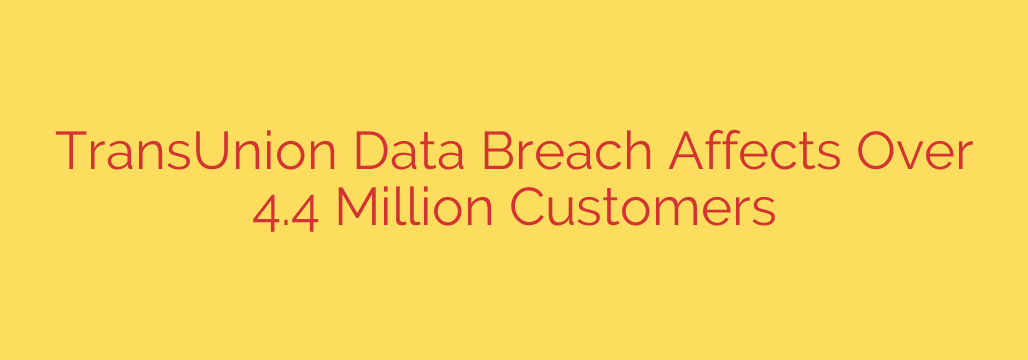
TransUnion Data Breach Leaks Data of 4.4 Million: How to Protect Yourself Now
In a significant blow to consumer data security, major credit bureau TransUnion has confirmed a massive data breach affecting millions. The security incident has exposed the sensitive personal and financial information of over 4.4 million individuals, raising serious concerns about identity theft and financial fraud.
If you have a credit file in the United States, it’s crucial to understand what happened, what data was compromised, and what steps you must take immediately to protect yourself.
What Happened in the TransUnion Breach?
According to reports, hackers gained unauthorized access to a TransUnion server through a compromised account. The attackers allegedly used a shockingly simple, weak password to bypass security measures, highlighting a critical vulnerability in the system designed to protect some of our most sensitive information.
This breach is not just another headline; it involves one of the three major credit reporting agencies responsible for compiling and maintaining financial data on nearly every adult consumer. When a credit bureau is compromised, the potential fallout is severe.
What Information Was Exposed?
The data stolen in this breach is a goldmine for cybercriminals. The compromised information is highly sensitive and can be used to perpetrate sophisticated identity theft schemes.
The exposed data reportedly includes:
- Full Names
- Social Security Numbers (SSNs)
- Dates of Birth
- Driver’s License Numbers
- Financial Account Information
- Detailed Credit History
With this information, criminals can open new lines of credit, file fraudulent tax returns, and commit other forms of identity fraud in your name. Because this data is permanent—you cannot change your Social Security Number or date of birth—the risk is long-term.
Actionable Steps to Protect Your Identity and Finances
It is essential to act swiftly and decisively to mitigate the potential damage from this breach. Do not wait for a notification letter that may never come. Assume your information has been compromised and take the following steps now.
1. Place a Credit Freeze with All Three Bureaus
This is the single most effective action you can take. A credit freeze, also known as a security freeze, restricts access to your credit report, which means lenders cannot view your file to approve a new line of credit. If fraudsters can’t open new accounts in your name, their efforts are largely blocked.
A credit freeze is free by law. You must place a freeze with each of the three major credit bureaus individually:
- Equifax: 1-800-685-1111 or visit their website.
- Experian: 1-888-397-3742 or visit their website.
- TransUnion: 1-888-909-8872 or visit their website.
2. Monitor Your Financial Accounts and Credit Reports
While a freeze stops new accounts, it doesn’t stop fraud on your existing accounts. Review your bank, credit card, and other financial statements daily for any transactions you don’t recognize.
You are also entitled to a free copy of your credit report from each of the three bureaus every week through AnnualCreditReport.com. Check these reports for any accounts or inquiries you did not authorize.
3. Enable Two-Factor Authentication (2FA)
Strengthen the security on all your important online accounts, especially banking, email, and financial portals. Two-factor authentication adds a critical layer of security by requiring a second form of verification (like a code sent to your phone) in addition to your password. This makes it much harder for criminals to access your accounts, even if they have your login credentials.
4. Beware of Phishing Scams
Cybercriminals will leverage the information from this breach to create highly convincing phishing emails, text messages, and phone calls. They may pose as TransUnion, your bank, or a government agency to trick you into revealing more information.
- Never click on unsolicited links or download attachments from suspicious emails.
- Do not provide personal information over the phone or via email unless you initiated the contact.
- Be skeptical of any communication that creates a sense of urgency or threatens you.
Staying vigilant is your best defense in the wake of this serious data breach. By taking these proactive steps, you can significantly reduce your risk of becoming a victim of identity theft and financial fraud.
Source: https://securityaffairs.com/181662/data-breach/transunion-discloses-a-data-breach-impacting-over-4-4-million-customers.html








